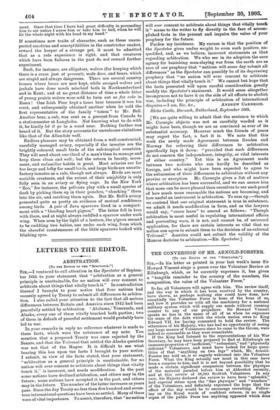SIR,—I ventured to call attention in the Spectator of Septem-
ber 16th to your statement that "arbitration as a general principle is unattainable, for no nation will ever consent to arbitrate about things that vitally touch it." In contradiction thereof I brought to your notice that four nations bad recently agreed by Treaty to submit all differences to arbitra- tion. I also called your attention to the fact that all serious differences between Britain and America since 1812 had been peacefully settled by arbitration. Alabama,' Venezuela, and Alaska, every one of these vitally touched both parties ; two of them in default of peaceful settlement would probably have led to war.
In your remarks in reply no reference whatever is made to these facts, which were the substance of my note. You mention that a proposed Treaty was once rejected by the . Senate, and that the Tribunal that settled the Alaska question was not that of the Hague. It is difficult to see what bearing this has upon the facts I brought to your notice. I submit, in view of the facts stated, that your statement, "arbitration as a general principle is unattainable, for no nation will ever consent to arbitrate about things that vitally .touch it," is incorrect, and needs modification. In, the past
• some nations have declined arbitration, and others may in the future ; some nations have accepted it in the past, and others may in the future. The number of the latter increases as years pass. Since the Jay Treaty no less than five hundred and seven- ' teen international questions have been so settled. Many of these were of vital importance. To assert, therefore, that " no nation
will ever consent to arbitrate about things that vitally touch it" seems to the writer to fly directly in the face of accom• plished facts in the present and impairs the value of your prophecy for the future.
Pardon my insistence. My excuse is that the position of the Spectator gives undue weight to even such positive, un- qualified, and, as we believe, incorrect statements as that regarding arbitration. We who see in its adoption the sure agency for banishing man-slaying war from the earth are as sure of our prophecy that "nations will some day submit all differences" as the Spectator can possibly be of its depressing prophecy that "no nation will ever consent to arbitrate about things that vitally touch it." We cannot but hope that the facts presented will upon careful consideration greatly modify the Spectator's statement. It would seem altogether incongruous not to have it on the side of all efforts to abolish war, including the principle of arbitration of international disputes.—I am, Sir, &c., ANDREW CARNEGIE. Skibo Castle, Dornoch, Sutherland, September 20th.
[We are quite willing to admit that the sentence to which Mr. Carnegie objects was not as carefully worded as it might have been, though we are as convinced as ever of its substantial accuracy. However much the friends of peace may regret the fact, a fact it is. We note that this week the newly made Agreement between Sweden and Norway for referring their differences to arbitration specifically lays it down : "provided that such differences do not concern the independence, integrity, or vital interests of either country." Yet this is an Agreement made between two nations who can hardly be described as foreign, and who might have been expected to agree to the submission of their differences to arbitration without any proviso or exception. Mr. Carnegie gives a list of matters where arbitration has been successful, and we can assure him that none can be more pleased than ourselves to see such proof of how much more reasonable the nations are becoming, and how useful an instrument is arbitration. To sum up :—though we contend that our original statement is true in substance, we admit it needs modification in form, and as the lawyers would say, "crave leave" to amend as follows : "Though arbitration is most useful in regulating international affairs and preventing wars, it is not, and cannot be, of universal application, for there are certain interests so vital that no nation can agree to submit them to the decision of an external Tribunal." America could not submit the validity of the Monroe doctrine to arbitration.—ED. Spectator.]










































 Previous page
Previous page